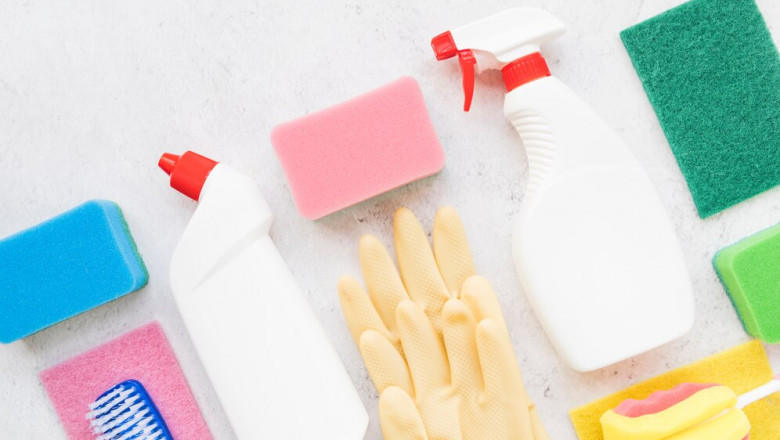views
Cleanliness plays a vital role in maintaining a healthy environment, whether at home, in the workplace, or in public spaces. Hygiene cleaning solutions are essential for eliminating germs, reducing the spread of infections, and ensuring overall well-being. With the right products and practices, individuals and businesses can create safer environments. This article explores the importance of hygiene cleaning solutions, their benefits, types, and best practices for effective cleaning.
Why Hygiene Cleaning Solutions Matter
Germs, bacteria, and viruses are everywhere. They can spread quickly through contact with contaminated surfaces, leading to illness and infections. Hygiene cleaning solutions help by:
-
Killing harmful microorganisms: Cleaning solutions eliminate bacteria, viruses, and fungi that cause diseases.
-
Reducing the risk of infections: Regular cleaning prevents the spread of illnesses like colds, flu, and foodborne diseases.
-
Improving indoor air quality: Dust, mold, and allergens are minimized, creating a healthier atmosphere.
-
Enhancing safety: Proper cleaning prevents the buildup of dirt and grime, reducing the risk of slips and falls.
Types of Hygiene Cleaning Solutions
Different cleaning solutions are designed for specific purposes. Choosing the right one depends on the surface, level of contamination, and intended use. Here are some common types:
1. Disinfectants
Disinfectants kill bacteria, viruses, and fungi on surfaces. They are commonly used in healthcare settings, kitchens, and high-touch areas.
-
Examples: Alcohol-based disinfectants, quaternary ammonium compounds, chlorine-based solutions.
-
Best for: Hospitals, schools, offices, and homes.
2. Sanitizers
Sanitizers reduce the number of germs to a safe level, making them ideal for food contact surfaces and hand hygiene.
-
Examples: Hand sanitizers, surface sanitizing sprays.
-
Best for: Restaurants, food processing plants, and household kitchens.
3. Multi-Purpose Cleaners
These cleaners remove dirt, grease, and grime while also providing some level of disinfection.
-
Examples: All-purpose sprays, biodegradable cleaning solutions.
-
Best for: General cleaning in homes and businesses.
4. Antibacterial Soaps and Hand Washes
These products are formulated to kill germs on the skin, preventing hand-to-hand transmission of infections.
-
Examples: Liquid hand soaps, foam antibacterial washes.
-
Best for: Homes, hospitals, offices, and restaurants.
5. Industrial Cleaning Solutions
Designed for heavy-duty cleaning in factories, warehouses, and large facilities.
-
Examples: Degreasers, heavy-duty floor cleaners.
-
Best for: Manufacturing plants, automotive industries, and construction sites.
Best Practices for Effective Cleaning
Using hygiene cleaning solutions correctly enhances their effectiveness. Follow these best practices for optimal results:
1. Follow the Product Instructions
Each cleaning solution has specific guidelines for use. Read and follow the manufacturer’s instructions to ensure maximum effectiveness.
2. Use the Right Cleaning Tools
-
Microfiber cloths trap dust and bacteria better than regular cloths.
-
Mops and brushes should be cleaned and replaced regularly.
-
Disposable wipes are convenient for the quick disinfection of high-touch surfaces.
3. Clean High-Touch Areas Frequently
Surfaces like doorknobs, light switches, countertops, and electronic devices harbor germs. Disinfect these areas multiple times a day, especially in shared spaces.
4. Ensure Proper Ventilation
Many cleaning products contain chemicals that can irritate the lungs. Open windows and use fans to improve airflow while cleaning.
5. Wear Protective Gear
For strong disinfectants and industrial cleaners, wear gloves and masks to prevent skin irritation and inhalation of harmful fumes.
6. Store Cleaning Products Safely
-
Keep cleaning solutions out of reach of children and pets.
-
Store in a cool, dry place away from direct sunlight.
-
Avoid mixing chemicals, as some combinations can produce toxic gases.
Benefits of Regular Hygiene Cleaning Practices
Maintaining a consistent cleaning routine offers numerous advantages:
-
Prevents Illness: Reduces the spread of viruses and bacteria that cause infections.
-
Increases Productivity: Clean workplaces lead to fewer sick days and a healthier workforce.
-
Creates a Pleasant Environment: A tidy space improves mood and overall well-being.
-
Enhances Business Reputation: Cleanliness is crucial in industries like hospitality and food service.
Choosing the Right Hygiene Cleaning Solutions
Selecting the best cleaning products depends on your specific needs. Consider the following factors:
-
Effectiveness: Check labels for ingredients that target bacteria and viruses.
-
Safety: Opt for eco-friendly and non-toxic formulas when possible.
-
Ease of Use: Choose products that simplify the cleaning process.
-
Cost-Effectiveness: Balance quality with affordability for long-term use.
Conclusion
Hygiene cleaning solutions are essential for maintaining health and preventing the spread of germs. Whether at home, in the office, or in public spaces, using the right cleaning products and techniques ensures a safer environment. By following best practices and choosing effective solutions, individuals and businesses can promote better hygiene and well-being for everyone.














Comments
0 comment